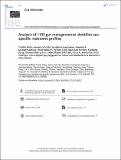| dc.contributor.author | Sinha, Trishla | |
| dc.contributor.author | Vich Vila, Arnau | |
| dc.contributor.author | Garmaeva, Sanzhima | |
| dc.contributor.author | Jankipersadsing, Soesma A. | |
| dc.contributor.author | Imhann, Floris | |
| dc.contributor.author | Collij, Valerie | |
| dc.contributor.author | Bonder, Marc Jan | |
| dc.contributor.author | Jiang, Xiaofang | |
| dc.contributor.author | Gurry, Thomas Jerome | |
| dc.contributor.author | Alm, Eric J | |
| dc.contributor.author | D’Amato, Mauro | |
| dc.contributor.author | Weersma, Rinse K. | |
| dc.contributor.author | Scherjon, Sicco | |
| dc.contributor.author | Wijmenga, Cisca | |
| dc.contributor.author | Fu, Jingyuan | |
| dc.contributor.author | Kurilshikov, Alexander | |
| dc.contributor.author | Zhernakova, Alexandra | |
| dc.date.accessioned | 2020-07-21T20:03:26Z | |
| dc.date.available | 2020-07-21T20:03:26Z | |
| dc.date.issued | 2018-10 | |
| dc.date.submitted | 2018-08 | |
| dc.identifier.issn | 1949-0976 | |
| dc.identifier.issn | 1949-0984 | |
| dc.identifier.uri | https://hdl.handle.net/1721.1/126293 | |
| dc.description.abstract | Published with license by Taylor & Francis Group, LLC. Several gastrointestinal diseases show a sex imbalance, although the underlying (patho)physiological mechanisms behind this are not well understood. The gut microbiome may be involved in this process, forming a complex interaction with host immune system, sex hormones, medication and other environmental factors. Here we performed sex-specific analyses of fecal microbiota composition in 1135 individuals from a population-based cohort. The overall gut microbiome composition of females and males was significantly different (p = 0.001), with females showing a greater microbial diversity (p = 0.009). After correcting for the effects of intrinsic factors, smoking, diet and medications, female hormonal factors such as the use of oral contraceptives and undergoing an ovariectomy were associated with microbial species and pathways. Females had a higher richness of antibiotic-resistance genes, with the most notable being resistance to the lincosamide nucleotidyltransferase (LNU) gene family. The higher abundance of resistance genes is consistent with the greater prescription of the Macrolide-Lincosamide-Streptogramin classes of antibiotics to females. Furthermore, we observed an increased resistance to aminoglycosides in females with self-reported irritable bowel syndrome. These results throw light upon the effects of common medications that are differentially prescribed between sexes and highlight the importance of sex-specific analysis when studying the gut microbiome and resistome. | en_US |
| dc.language.iso | en | |
| dc.publisher | Informa UK Limited | en_US |
| dc.relation.isversionof | http://dx.doi.org/10.1080/19490976.2018.1528822 | en_US |
| dc.rights | Creative Commons Attribution-NonCommercial-NoDerivs License | en_US |
| dc.rights.uri | http://creativecommons.org/licenses/by-nc-nd/4.0/ | en_US |
| dc.source | Taylor & Francis | en_US |
| dc.title | Analysis of 1135 gut metagenomes identifies sex-specific resistome profiles | en_US |
| dc.type | Article | en_US |
| dc.identifier.citation | Sinha, Trishla et al. "Analysis of 1135 gut metagenomes identifies sex-specific resistome profiles." Gut Microbes 10, 3 (October 2018): 358-366 © 2018 The Author(s) | en_US |
| dc.contributor.department | Massachusetts Institute of Technology. Department of Biological Engineering | en_US |
| dc.contributor.department | Massachusetts Institute of Technology. Center for Microbiome Informatics and Therapeutics | en_US |
| dc.contributor.department | Broad Institute of MIT and Harvard | en_US |
| dc.contributor.department | Massachusetts Institute of Technology. Department of Civil and Environmental Engineering | en_US |
| dc.relation.journal | Gut Microbes | en_US |
| dc.eprint.version | Final published version | en_US |
| dc.type.uri | http://purl.org/eprint/type/JournalArticle | en_US |
| eprint.status | http://purl.org/eprint/status/PeerReviewed | en_US |
| dc.date.updated | 2020-03-04T15:46:10Z | |
| dspace.date.submission | 2020-03-04T15:46:13Z | |
| mit.journal.volume | 10 | en_US |
| mit.journal.issue | 3 | en_US |
| mit.license | PUBLISHER_CC | |
| mit.metadata.status | Complete | |
